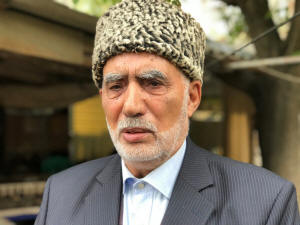Homesick and bellicose, Karabakh's exiled Azeris yearn for return
 Send a link to a friend
Send a link to a friend
 [October 30, 2020]
By Olzhas Auyezov and Nailia Bagirova [October 30, 2020]
By Olzhas Auyezov and Nailia Bagirova
BAKU (Reuters) - Gassan Akhmedov has one
last wish - to return to the land of his birth, a land he says has been
occupied for more than 25 years.
That dream came a step closer, the 80-year-old resident of Baku says,
when Azeri troops captured the region of Jabrayil as part of their
southern march on the enclave of Nagorno-Karabakh.
"Our native village has been liberated," said Akhmedov, an elder in a
run-down neighbourhood of the Azeri capital populated largely by exiles
of the 1991-94 war over Nagorno-Karabakh.
"We are waiting for authorities to clear it of landmines and to rebuild
our houses so that we can return. That is where the graves of our
fathers and grandfathers are."
Azerbaijan and Armenia are locked in the South Caucasus region's
bloodiest fighting in decades. At stake is the fate of the mountainous
enclave of Nagorno-Karabakh and seven Azeri regions that surround it.

Nagorno-Karabakh is internationally recognised as part of Azerbaijan but
is populated and controlled by ethnic Armenians. Hundreds, perhaps
thousands, have been killed since fighting flared again on Sept. 27.
Three ceasefires have crumbled fast.
In Baku, residents speak of military gains that have seen Azerbaijan
retake some of the territory lost in the 1990s. Billboards around the
city and posters in shop windows have one, unambiguous message: 'Karabakh
is Azerbaijan. Karabakh is ours'.
"I feel pain for our boys," said Olga Ismailova, an accountant, whose
son lost a friend in the latest fighting, "but we must retake what is
ours."
Armenia, like Azerbaijan, regards Nagorno-Karabakh as part of its
historic homeland and says the population there needs its protection.
Azerbaijan rejects any solution that would leave Armenians in control of
the enclave.
Azerbaijan's defence ministry has said 55,000 volunteers signed up in
July, during an earlier skirmish, but more recent numbers are
classified.
Armenia says 10,000 people volunteered to take up arms on the first day
of fighting and hundreds of Armenian nationals from as far afield as
Argentina and the United States have rushed back to Armenia to begin
combat training.
[to top of second column]
|

Gassan Akhmedov, an 80-year-old elder of a refugee neighbourhood in
Azeri capital, talks to a reporter outside his home, in Baku,
Azerbaijan October 29, 2020. REUTERS/Olzhas Auyezov

BOOTS, CAMOUFLAGE RAINCOATS
Construction worker Ramin Aliyev, 42, lives with other exiles in a
district of small, shabby houses in Baku that grew outward from an
unfinished hospital used to house refugees in the 1990s.
He said that, despite his age, he had sent multiple letters asking
to be drafted and to put to use experience gained while serving in
an artillery unit in the Azeri exclave of Nakhchivan.
"I am ready to die for my motherland," he said. "Let my children be
proud of me."
Those who cannot fight have found other ways to support.
Pharmaceuticals executive Elnur Aliyev took an extended break from
work to raise funds and send supplies to the front lines.
At a makeshift sorting facility provided by a local bakery, he and a
dozen other volunteers pack boots, camouflage raincoats and hats
into crates. They sift through piles of donated shoes and clothes
for families who have fled shelling.
Aliyev said his group, one of several in Baku, had raised about
$235,000 from hundreds of contributors at home and abroad.
Local radio stations dedicate much of their airtime to patriotic
songs while Azerbaijan's blue-, red- and green-striped flag hangs
from many balconies, often side-by-side with the flag of Turkey, its
ally.

Even to the most patriotic exile, however, Baku is not home.
"Ever since I heard our village had been liberated, Baku has felt
foreign to me," said Nemat Samedov, 33, a child when his family
left. "I have signed up as a volunteer and I am waiting to be
drafted."
(Reporting by Olzhas Auyezov and Nailia Bagirova in Baku; Writing by
Robin Paxton; Editing by Janet Lawrence)
[© 2020 Thomson Reuters. All rights
reserved.] Copyright 2020 Reuters. All rights reserved. This material may not be published,
broadcast, rewritten or redistributed.
Thompson Reuters is solely responsible for this content. |